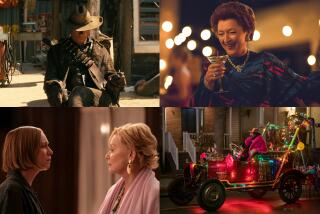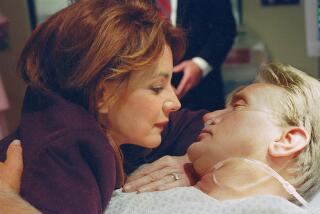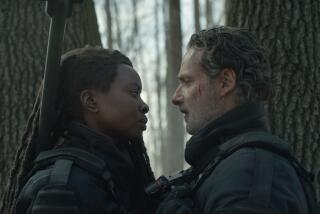‘The Walking Dead’ recap: Let’s have a little talk
My favorite moment of any given “Walking Dead” episode is the moment leading out of the teaser and into the opening credits, when the buzzing, anxious strings of the show’s theme song gradually crowd whatever is happening on screen off it so the audience can stare at some images of the world after the zombie apocalypse arrives.
I think I love this because the music is so perfect but also because it forces the audience into the minds of the characters on the show. They’re people always looking behind themselves, waiting for death to catch up. As a comfortable, privileged guy who lives in Long Beach and writes about TV for a living, I expect that music is about the closest I’m going to get to feeling that sort of all-consuming existential terror. The music is going to have to stand in for the dread. That it does so ably is one of the keys in explaining why this show can overcome seemingly any dry spell in the plot to rocket back on track.
That’s the thing, though: Heading into the second half of its third season, “The Walking Dead” is far from out of stories to tell. Rick is losing his mind. Daryl and Merle are back together again. Everybody has to care for a week-old baby. There’s a new group of survivors at the prison, just waiting to be accepted into the main group (as you know they inevitably must be). The iron grip the Governor held over Woodbury is starting to slip — or just getting stronger. And, most importantly of all, the actions of Rick and company, taken to get Glenn and Maggie back from the Governor’s clutches, would be setting the two parties on a path to all-out war, were it not for the fact that the Governor already seemed pretty interested in taking over the prison for himself. Yeah, there’s plenty of stuff going on.
PHOTOS: Walking Dead Hollywood Backlot
More power to “The Walking Dead,” then, for making “The Suicide King” a slower, talkier outing than most of this season’s episodes. Slow, talky episodes were what got the show in trouble with fans and critics in the much-maligned “everybody hangs out at Hershel’s farm” arc of season two. There were some fantastic moments in that season, but there were also plenty where it sometimes seemed like everybody involved had convinced themselves they were making “The Waltons,” not a zombie show. Season three has done a better job of keeping the nameless dread of the opening theme present in all moments, but it’s also built up such a head of steam that it’s probably necessary to step back and talk about some stuff.
One of the things I found most interesting about “Suicide King” was that it also decided to take a look at how far these characters have come from when we first met them. Granted, back in the early days of the show, a lot of these characters were indistinguishable zombie bait, and they summarily were eaten. But those that have stuck around this long have gotten some basic character shading — particularly under the watchful eye of Glen Mazzara, who ran the back half of season two and all of season three — and it’s fun to watch Daryl, say, get reduced to the character he was back in season one, when he was much more of an antagonist. He heads back out into the woods with his brother, because if forced to choose between blood and his newfound family, he’s going to choose his blood, but I have to believe this is just setting him up for the full Han Solo, where he will ride in triumphantly again, at a moment when he is most needed by our heroes.
To watch this episode is to be reminded that Daryl was kind of a repugnant guy back in season one, particularly when goaded on by his brother, or to be reminded that Carol seemed to disappear into the background as recently as the third season premiere. When singling out flaws of this show in the first two seasons, the lack of good character development was always at the top of my list, so it’s been surprising to me to see the show dig deeper and find shades in these characters I didn’t know existed. When the events of their captivity in Woodbury (and subsequent escape) drive a wedge between Glenn and Maggie, I was surprised to find that I actually cared to see if they found a way back to each other. And when Rick saw that hallucination of Laurie and went out of his mind at episode’s end, it actually felt earned, as opposed to something the show was doing just to decrease our heroes’ odds of survival against Woodbury in the coming war. He’s been through so much. You might start seeing things, too.
Put another way: I thought the slow, talky nature of the episode worked, because these are now characters I care much more about than I did when season two was having them do slow, talky things together. I can’t say this is my favorite episode of the season—that would go to the pleasantly off-kilter “Hounded”—but I was actually engaged by questions of whether Rick would find his way back to trusting people or whether Carl is finding a way to properly mourn his mother amid all the carnage and death. When Glenn stomps on a walker’s head over and over to let out his frustrations, it’s the episode’s requisite moment of gore, yes, but it’s also a nicely earned character moment.
Look: This show is never going to have the character depth of a show like “Mad Men” or “Breaking Bad.” But back when the series began, it seemed to think the characters were completely incidental to just having zombies show up every so often, and it paid for that decision in the second season, when the characters weren’t good enough to stand up to the weekly rigors of being on a popular television show. The third season has featured so many big, important events so far that I didn’t even notice how the show was sneaking some necessary character moments past me. I may not be as invested in these people as I am in the characters on other shows (on one level or another, they’re all zombie chow), but I actually care about them now, and that’s a trick I didn’t think the show would ever manage to pull off.
For the Record, 5 p.m. Feb. 11: A previous version of this post referred to events in “The Walking Dead” driving a wedge between the characters Glenn and Andrea. The characters involved are Glenn and Maggie.
ALSO:
PHOTOS: Walking Dead Hollywood Backlot
‘Walking Dead’: Steven Yeun’s Glenn is beating heart of AMC series
‘Walking Dead’: Glen Mazzara on the woman in white, Edgar Allan Poe
MORE FROM HERO COMPLEX
HERO COMPLEX: Pop culture unmasked
PHOTOS: 60 images from ‘The Hobbit’
VIDEO GAMES: The latest news and reviews
More to Read
The complete guide to home viewing
Get Screen Gab for everything about the TV shows and streaming movies everyone’s talking about.
You may occasionally receive promotional content from the Los Angeles Times.






